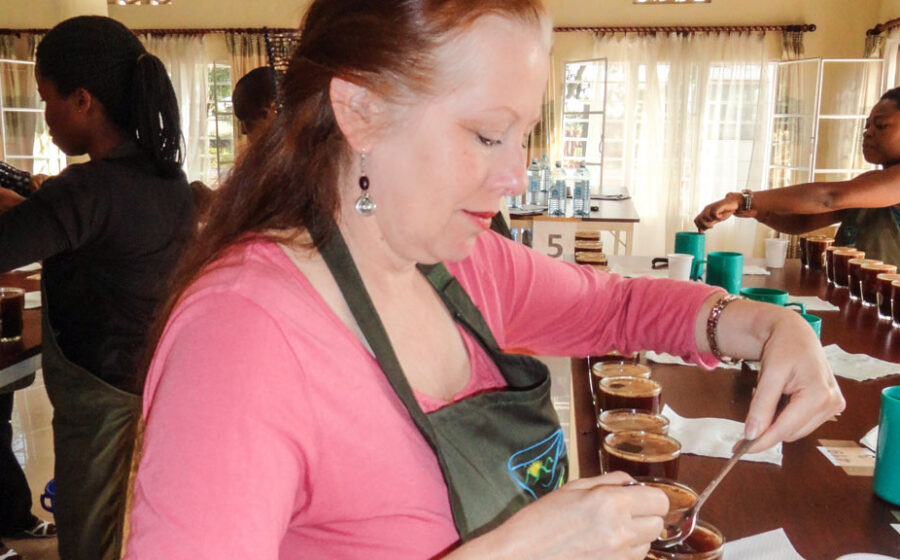[A]s a college student, Sherri Johns fueled her study groups with french presses full of coffee from origins around the world. Rather than focusing on the academic material, Johns would buzz around the room, collecting feedback on the nuances in flavor each origin displayed. Her love of coffee has never waned.
With over forty years in the industry, Johns has traveled the world to share and develop her coffee knowledge, from helping Starbucks grow their empire, to starting a chain of cafés in Malaysia, to her current work with Alliance for Coffee Excellence (ACE) as a trainer and head judge for Cup of Excellence (COE). She has also been a great friend to Fresh Cup throughout the years, partnering with magazine founder Ward Barbee to launch barista competitions, and working with past editor Steven Krolak to develop the Nine Bar column.
Johns made me an americano (a blend of COE coffees from Brazil and Honduras) and gave me the scoop on what it was like to brew coffee long before latte art, extraction measurements, and micro-roasting came into play.
This interview has been edited for clarity and space.
Coffee captivated you early in life. Why?
I attribute it to my mom. She was the generation that always had fresh percolator coffee, and every time we had guests come to the house or there was a visitor, she always brewed fresh coffee.
Did you drink coffee when you were young?
I really didn’t drink coffee until I moved to San Francisco. It was 1976 and I was going to school to be an art therapist at San Francisco State University. I was enamored with the espresso world. At that time, there weren’t really cafés like there are now. We had an espresso bar on campus and I was known as the pickiest customer. They’d see me in line and they’d switch off who was on bar. I was going to get a job off campus, and instead they offered me a job. I just fell into coffee.

We didn’t call ourselves baristas at the time. This was before the SCAA existed, before there were schools or consultants. I learned through self-exploration and by watching other people. During that time, there was a program called the San Francisco Fair and Competition and they had a barista competition—it was the first recorded barista competition, and that was in 1980. It was a very different competition than what we have today. The judges were separated from the baristas; you got to make one cappuccino, there was no practice time, and it was judged just on the taste. I won the competition three out of four years. It was kind of a big brouhaha at the time because I wasn’t Italian and I was female. My secret weapon was an ice cube in the steam pitcher. It was that simple, but very complicated, still.
How did being involved in competitions influence your career path?
Winning a competition was very exciting. I still just kept making drinks—it was all about cappuccinos and perfect foam and how do you enjoy a delicious cup of coffee, and why is it important? I ended up managing that espresso bar and from there I managed another café, then I owned and operated my own café.
When did you first travel to origin?
I traveled to Ethiopia and Kenya; it was on one trip and it was amazing. At that point, I hadn’t really traveled much, and that was really early on, after I’d won some competitions and been in the coffee business for a little while. I just decided it was time to get to origin.
The very first article I wrote was for Fresh Cup and it was about getting yourself to origin. It was just after that trip, and I realized what a wealth of information I’d garnered from that and what a depth of understanding and newfound appreciation for all the work that goes into it and I wanted to bring that back to the people because they weren’t traveling like they are now. I’ve been in coffee for forty years and I’ve been traveling to origin for over twenty-five years. Hundreds of trips and each one is equally exciting and new and thrilling.
How did you come to work for the Alliance for Coffee Excellence?
I began a private consulting business many years ago, and ACE was one of my clients. I’ve been a head judge with Cup of Excellence for thirteen years. I started working with ACE and COE and really believing in the program of what we do and what was being done at the time—putting money back to the farmers, helping them be discovered, and bringing their coffee to the world. As I was doing more work for Susie Spindler [founder of ACE], she finally said, “You know, Sherri, I can’t afford you as a consultant anymore, you should just come work for me.” I’ve been here four years.
What are some important things to know about Cup of Excellence?
You won’t find any other program that ensures 100 percent traceability like COE does. It allows all farmers to be on equal footing. Whether you’ve got a big farm or a little farm, it’s an open competition. It’s always about the people and the quality. When the coffees are auctioned off, many times that roaster and buyer will continue with that relationship.
—Ellie Bradley is Fresh Cup‘s editor.
















